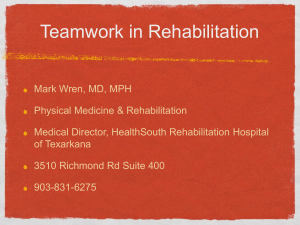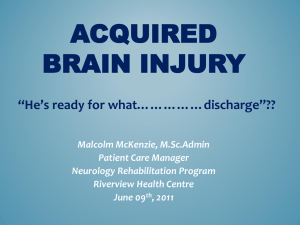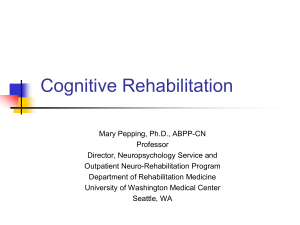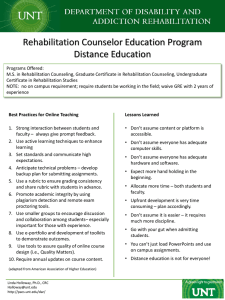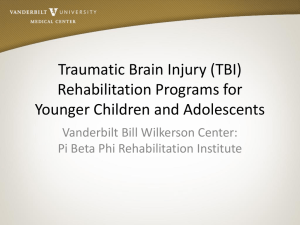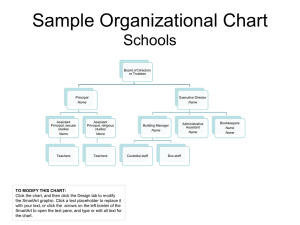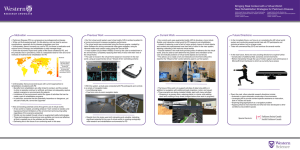Oliver Zangwill Centre Presentation
advertisement
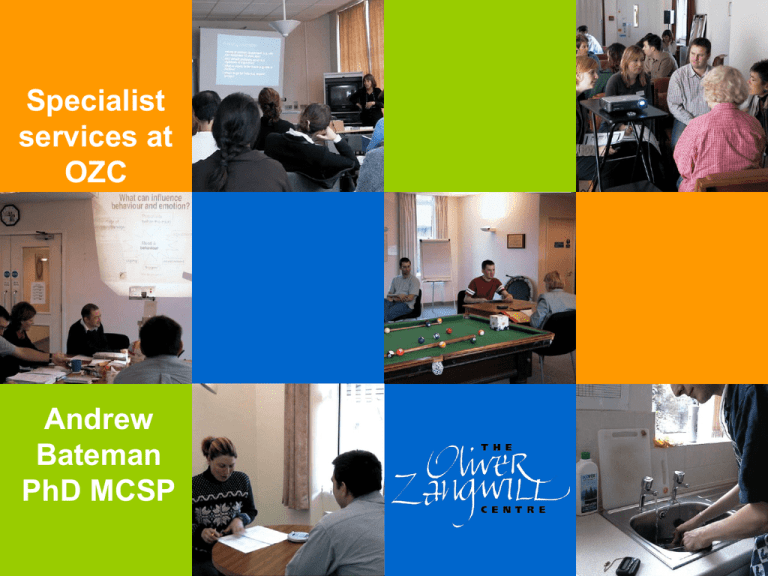
Specialist services at OZC Andrew Bateman PhD MCSP Ian ‘personal construct’ outcomes Work hard and achieve things 1 2 3 4 5 6 7 “GO OFF”, not achieve Happy and making others happy 1 2 3 4 5 6 7 A problem for others Head injury as the main thing in my life 1 2 3 4 5 6 7 One of the human race – just like everyone else Feeling confident 1 2 3 4 5 6 7 Loss of confidence Pre-Injury self Ideal self Change in ‘present self’ from start – end programme History Centre founded by Prof Barbara Wilson, opened November 1996 Modelled on Adult Day Hospital, Phoenix Arizona & Oklahoma programme Lifespan NHS Trust, Anglia & Oxford NHS Executive & MRC National Service Influenced by work of Prigatano, Ben-Yishay & Christensen Who was Oliver Zangwill ? Professor of Experimental Psychology, Cambridge University, 1952 - 1982. 1940’s Edinburgh working with war injuries. Major influence on British rehabilitation. First to apply neuropsychological knowledge to rehabilitation. Mission Statement To provide high quality rehabilitation for the individual cognitive, social, emotional, vocational and physical needs of people with non-progressive brain injury Oliver Zangwill Centre Team Clinical Manager Director of Research Research OT Research Fellow Research Assistant Clinical Specialist OT HEAD III OT Senior I OT Therapy Assistant Lead SALT Specialist SALT Specialist SALT (BIRT) Lead Psychologist Support Manager Clinical Psychologist Clinical Psychologist Course Administrator Research Assistant Psychology Assistant Psychology Assistant Admin Assistant NeuroPage Jackie Galway CCS, Stroke Research student at Uni.Cambridge Jill Winegardner Andrew Bateman E.C. & F Neuro Rehabilitation Clinical Lead City & South, Huntingdon Clare Keohane (Clinical/Supervision 02 3/7) Clinical Psychologist, (B8) P/T Head Specialist Speech & Language Therapist AIMS Research 2/7 CLAHRC (8A) P/T 3/7. Mon, Tues, Thurs Cat Ford Clinical Psychologist Barbara Wilson (B8A) F/T P/T (1/7) Emma Leah Bousie Rehab Psychology Assistant Rehab Psychology Assistant vol) Temp, F/T (B4) F/T Eve Greenfield Research Occupationa l Therapist Gemma Hardy Research Assistant MRC-CBU (P/T) Head Occupational Therapist (B8A) P/T (5½ days 28) Leyla Prince Clinical Psychologist 1/7 CLAHRC Psychology Research Assistant OZ (F/T) 3/7 Clinical/SPM OZ (F/T) Rachel Everett (Voluntary) 1/7CBU Marketing & Courses Administrator Rachel Harrison Occupational Therapist (B5) F/T Band 7 Maria Martin Saez FT Michelle Young Support Manager (B5) P/T 30hrs 5½ days Supervise all admin Psychology Research Assistant 2/7 CLAHRC Donna Malley Occupational Therapist Clinical Specialist (B8A) clinicall (new student) Anna Piasceka Seconded manager of paediatric team (P/T 1/7) Mon (2 Paed) 1/7 ozc Weds (B4) F/T Apr il (B7) (B7) F/T Rehab Psychology Assistant April – 4/7 Clinical/SPM Diana McCollum Specialist Speech & Language Therapist Specialist Speech & Language Therapist (B7) F/T Chantel Williams MRC-CBU (F/T) Sue Brentnall Band 7 (vacant) F/T Carolyne Threadgold Rehabilitation Assistant (B4) P/T 4/7 Fiona Ashworth Sharon McEwing (B3) P/T 20hrs Personal/ Administration Assistant (B3) F/T 2x full days (Mon, Tues), 1x½ day (Weds) Helen Howe Bank admin P/T 12hrs Am – Tues, Thurs, Donna Moore NeuroPage Administrator (B2) P/T 15hrs Full – Mon, Part Weds/Fri Band 3 (?F/T) (Amy Rideout) TEMP The Team 3 Clinical Psychologists 2.6 (w.t.e.) Occupational Therapists 1.6 (w.t.e.) Speech & Language Therapists 3 Psychology/rehabilitation Assistants 1 Clinical Manager 4 Administrators Visiting Neuropsychiatrist (0.1 w.t.e) Access to Neurologist & Physiotherapy Principles of rehabilitation approach Holistic approach Addresses cognitive, emotional and social consequences of ABI Hierarchy of stages (engagement, awareness, mastery, control, acceptance, identity) Safe environment 5 activities of OZC Assessment Rehabilitation Research Education NeuroPage + service neurorehab management for CCS Assessment and Rehabilitation Sources of Referrals Private: Self-referral, relative, solicitor, insurance company. NHS: G.P, NHS clinician, Consultant Weekly preliminary assessments Fortnightly detailed assessments 4 intakes per year for full programmes Referrals to Andrew Bateman, Clinical Service Manager. Referral criteria Adults with non-progressive acquired brain injury Medically stable - +/- 18 months post injury Not demonstrating severe disruptive behavioural disorders or marked physical disability Capable of managing in community B&B or self-catering accommodation. Require IDT for cognitive, psychological and social issues restricting their participation in daily life Client Demographics Gender Age 45+ 17% Female 27% 16-24 19% 35-44 22% Male 73% N=95 25-34 42% Client Demographics Aetiology Months Post Injury 5+ yrs 21% OHI Other 6% 3% <=1 year 15% Anoxia 6% CVA 8% 1-2 yrs 23% 4-5 yrs 14% 3-4 yrs 12% N=95 2-3 yrs 15% CHI 77% Living arrangements Local B&B or Hotel accommodation Self-catering or rental Travel reimbursement for people receiving benefits Care support Own evening meal Stages of Assessment Preliminary Assessment: • 1 day • 1 clinician and assistant psychologist • Neuropsychological screening assessments & discussion with client & significant other • Future actions agreed Detailed Assessment: • • • • • 8 days Formal neuropsychological assessments Functional discussion & observation Experience aspects of the programme Future actions agreed Assessment Holistic neuropsychological assessment by experienced clinical team cognitive functioning, incl. attention, memory & executive skills perceptual skills speech & language skills, incl. social communication assessment of mood & behaviour independent living skills, incl. vocational aspects social context, incl. family & environmental considerations The role of ‘formulation’ The process of deriving hypotheses concerning the nature, causes and factors influencing current problems or a client’s current situation. Considers the multitude of possible influences on an individual’s level of functioning and psychological state Helps clinician, clinical team and the client to understand the problems. The role of ‘formulation’ Range of assessments and treatment interventions carried out by different professionals. Opportunity to bring together results of these assessments into a single coherent formulation Promotes a shared understanding of problems - visual element useful Aids team working Family/social support Brain pathology Stroke, head injury, etc Cognitive Impairment e.g. Memory Perception Language Attention Executive Affect Insight e.g. Depression Anxiety Anger Confidence Motivation Pre-morbid factors e.g. coping style Physical e.g. Hemiplegia Sensory loss Dysarthria Pain Loss Functional consequences e.g. Work ADL Leisure Driving Evans, Wilson et al 2009 Family factors Brain pathology Personal beliefs Aneurysm Affect Depression Cognition & communication Memory Problem solving Dual tasking Physical Headache Fatigue Body image Worry & rumination Identity: who am I now? Loss of role Functional consequences e.g. Avoidance of children avoidance of anything that highlights difficulties A biopsychosocial model (Evans, 2002) Holistic Neuropsychological rehabilitation aims to: enable the client to gain awareness and understanding of the consequences of his/her brain injury, facilitate acceptance and adjustment to the consequences of brain injury enable the client to adopt compensatory strategies Therapeutic encounters are structured around the clients’ goals that will relate to functional daily activities, participation and vocational domains. Aims of rehabilitation Our rehabilitation aims are to: • Improve social participation • Enable engagement in meaningful activity in the home and community • Improve acceptance and understanding of the consequences of brain injury • Promote wellbeing of client and family Environment Affective Social Physical Occupation Spirituality Cognitive Physical Leisure Person From Enabling Occupation: An Occupational Therapy Perspective, © CAOT 1997 Pre-morbid personality and life style Patient and family Current problems Cognitive Emotional Psychosocial Behavioural Neuropsychological assessment Psychometric Localisation Cognitive theoretical models Exclusion models Ecologically valid models Personality assessments Interviews European Injury Questionnaire Brain Injury Community Rehabilitation Outcomes Nature of brain injury? Severity? Extent? Location? Neurological investigations Imaging Monitoring over time How much recovery to expect? Theories of recovery Cause of brain damage? Studies of changes over time Reassessment Behavioural assessments Observations Assess to identify these in detail Models of cognitive functioning Language Reading Memory Executive Functioning Attention Emotional and Psychosocial Models e.g. models from Cognitive Behaviour Therapy Effect of affect on memory, attention, etc Behavioural Models e.g. SORKC Natural settings Simulated settings Questionnaires Checklist Self report measures Rating scales interviews Decide on treatment (negotiate goals with patient, family and staff members) Will you focus on Impairments Disabilities or Handicap? How will you teach/achieve this? (Refer to theories of learning) Following evaluation may need to revise approach How will you evaluate success or otherwise? Will you try to Restore lost function? Encourage anatomical reorganisation? Use residual skills more efficiently? Find an alternative means to the final goal? Modify the environment? Use a combination of the above? From Wilson 2009 What evidence is there for the success of these approaches Core Components (our reply to Prigatano core components) Therapeutic milieu Compensatory strategies Involvement of family Psychological therapy Functional & vocational meaningful activities Shared team understanding Stages of the Rehabilitation programme Full Rehabilitation programme • 24 weeks total • Intensive & integration phases • 1:1 & group sessions – – – – – – Cognitive group Understanding Brain Injury group Mood Management group Communication group Psychological Support group Other groups • Client-centred goal planning Reviews 3, 6 & 12 months post-programme IPC Allocated at DA & for Programme/Reviews Main liaison with family and other professionals/services Oversees programme for participants Weekly contact Co-ordinates reports & referrals Goals Starting point at assessment with question ‘What are your goals for rehabilitation?’ Other tools used are the COPM, Rivermead Life Goals questionnaire and individual interviews. A team meeting is used to establish ‘SMART’ wording. Goal Categories Understanding Brain Injury E.g. Show an accurate understanding of her difficulties and be able to explain these to 2 relatives and 2 members of the Centre staff Managing Daily Activities Independently E.g. To be able to prepare a simple evening meal for the family on a weekly basis with supervision using identified strategies Goal Categories Recreational Activities E.g. Will be engaged in 2 chosen leisure activities on at least a weekly basis (playing pool and wood-work). Work or Study Plans E.g. Will be engaged in a work trial and have an identified plan for return to paid employment within 6 months. Outcomes Goal Achievement Standardised Questionnaires EBIQ DEX CSI EuroQuol COPM Research Research Professor Barbara Wilson OBE Clinical team Development, application & evaluation of developments in rehabilitation research. Current research programme Recent presentations & publications Links with MRC Feeling hopeless about the future Feeling sad Feeling lonely Feelings of worthlessness Feeling inferior Feeling lonely, even when with others Feeling life is not worth living Preferring to be alone Crying easily Threshold map for depression subscale of EBIQ n=226 patients (baseline) EBIQ Depression subscale Four items with significant mis-fit therefore removed leaving robust 5 item scale before and after data person location data entered into t test n=44 start mean score 9.95; discharge 8.64; t = 3.4; p<0.01 Differential item functioning - before and after rehab. Impact of rehabilitation on self rated responses to EBIQ item 9, (feeling hopeless about the future) uniform differential item function, n=44; F=4.12, p<0.05 F=4.08; p=0.04 Markers of recognition & success at OZC Client outcomes and feedback Visiting scholars 2008-9 from Thailand, Granada and Madrid, Toronto, Sao Paulo Published RCP guidelines for stroke Published peer-reviewed articles Published book Invited papers/conference speeches (?how many) New scholarship/learning to meet objectives eg anatomy (ongoing) vision (workshop, collaborations ongoing) New PhD students Lectureship in University Cambridge CLAHRC practitioner researchers Courses Courses A series of courses & workshops are run each year Can offer courses specific to needs in topics related to neuropsychological rehabilitation Further info. on current courses go to www.ozc.nhs.uk NeuroPage NeuroPage Currently 40 people using service regularly Useful for people with memory difficulties, and dysexecutive difficulties Evidence based service recent text to voice development - ideal for those who can’t read Text messaging developments, new “generations” of phones (eg video/image messages) Thank you for your attention! Andrew.bateman@ozc.nhs.uk

